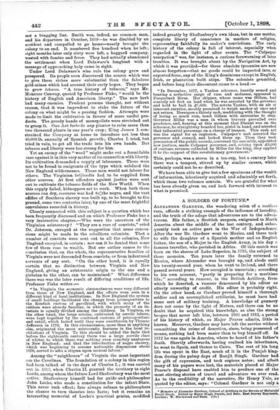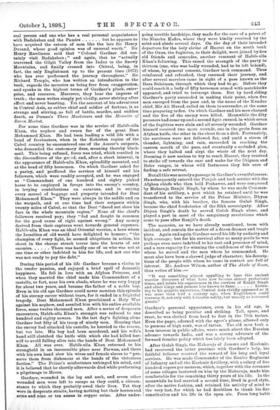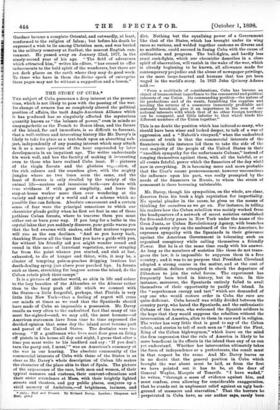A SOLDIER OF FORTUNE.*
ALEXANDER GARDNER, the wandering scion of a restless race, affords a striking example of the influence of heredity, and the truth of the adage that adventures are to the adven- turous. His father, a Scottish surgeon, emigrated to North America about the middle of the last century, and subse- quently took an active part in the War of Independence. After the war Dr. Gardner went to Mexico, and there took to wife the daughter of a Spanish mother and an English father, the son of a Major in the English Army, in his day a famous traveller, who perished in Africa. Of this match was born on the shores of Lake Superior, in 1785, the subject of these memoirs. Ten years later the family returned to Mexico, where Alexander was brought up, and abode until his twenty-second year, when he went to Ireland, and there passed several years. How occupied is uncertain ; according to his own account, "partly in preparing for a maritime life;" according to rumour, in the British Artillery, from which be deserted, a rumour denounced by his editor as utterly unworthy of credit. His editor is probably right. On the other band, as Gardner proved himself a thorough soldier and an accomplished artillerist, he must have had some sort of military training. A knowledge of gunnery does not come by the light of Nature, and there can be no doubt that he acquired this knowledge, as also the strong brogue that never left him, between 1805 and 1812, a period of his history of which, as Major Pearse admits, little is known. Moreover, Gardner may have left the service without committing the crime of desertion, since, being possessed of means, nothing had been easier than to buy himself off. In 1812 he was again in America, where he heard of his father's death. Shortly afterwards, having realised his inheritance, he went to Spain, and thence to Cairo. The rest of his long life was spent in the East, much of it in the Punjab king- dom during the palmy days of Ranjit Singh. Gardner had the gift of expression, and took copious notes; and albeit many of his papers were lost, the materials placed at Major Pearse's disposal have enabled him to produce one of the most stirring stories of travel and adventure we ever read. As to the credibility of the narrative, Sir Henry Yule, as quoted by the editor, says : "Colonel Gardner is not only a • Memoirs of Alexander Gardner, Colonel of Arra/erg in the Service of Maharnhi Ranjit Singh. Edited by Major Hugh Pearse, 2nd Ban. East Surrey Regiment. London: W. Blackwood and Sons. [153.]
real person and one who has a real personal acquaintance
with Badakshan and the Pamirs but he appears to have acquired the esteem of men like the late Sir Henry Durand, whose good opinion was of unusual worth." Sir Henry Rawlinson said that " Colonel Gardner did cer- tainly visit Badakshan ; " and again, that he "actually traversed the Gilgit Valley from the Indus to the Snowy Mountains, and finally crossed into Chitral, being, in fact, the only Englishman up to the present time (1872) who has ever performed the journey throughout." Sir Richard Temple, who has written an introduction to the book, regards the memoirs as being free from exaggeration, and speaks in the highest terms of Gardner's pluck, enter- prise, and resource. Moreover, they bear the impress of truth ; the man writes simply yet vividly, never striving after effect and never boasting. Yet the account of his adventures in Central Asia, as robber chief and soldier of fortune, is as strange and stirring, as full of battle, murder, and sudden death, as Dumas's Three Musketeers and the Memoirs of Baron Maid.
For some time Gardner was in the service of Habib-ulla Khan, the nephew and sworn foe of the great Dost Mohammed Khan. He had been leading a wild life with a band of freebooters, when in the Kohistan region of the Cabal country he encountered one of the Ameer's outposts, who demanded the customary dues, meaning thereby black- mail. This being refused, force was tried, which resulted in the discomfiture of the gurrd, and, after a short interval, in the appearance of Habib-calla Khan, splendidly mounted, and at the head of fifty horsemen. On which Gardner asked for a parley, and proffered the services of himself and his followers, which were readily accepted, and he was engaged as " Commandant of one hundred and eighty picked horse to be employed in forays into the enemy's country, in levying contributions on caravans, and in seizing every morsel of baggage and property intended for Dost Mohammed Khan." They were always in the saddle and on the warpath, and at one time had their outposts within twenty miles of Cabal, so that the Bost "dared not show his face in the whole mountain region." None of the chief's followers received pay; they "fed and fought in common for the good cause of right against wrong." Any money derived from their captures went towards general expenses. Habib-ulla Khan was an ideal Oriental warrior, a hero whom the Israelites of old would have delighted to honour ; " the champion of every fight, he seemed ubiquitous in action, his shoat in the charge struck terror into the hearts of our enemies There was hardly one of us who was not at one time or other indebted to him for life, and not one who was not ready to pay the debt."
During this period of his life Gardner became a victim to the tender passion, and enjoyed a brief spell of domestic happiness. He fell in love with an Afghan Princess, and when they married the chief made him Commandant of a castello, or fort, near his own abode, where he was very happy for about two years, and became the father of a noble boy. Even in his old age Gardner could never mention this episode of his stormy career without tears, for it ended in a frightful tragedy. Dost Mohammed Khan proclaimed a Holy War against his nephew, and assailed him with his entire available force, some twelve thousand men. After a series of desperate encounters, Habib-ulla Khan's strength was reduced to one hundred and eighty sowers. In the last day's fighting alone Gardner lost fifty of his troop of ninety men. Hearing that the enemy had attacked his castello, he hurried to the rescue, but too late. His boy had been murdered, and his wife's hand still clutched the knife with which she had killed her- self to avoid falling alive into the hands of Dost Mohammed Khan. All was over. Habib-rdla Khan returned to his stronghold in an inaccessible place near Parwan, and there with his own hand slew his wives and female slaves to " pre- serve them from dishonour at the hands of the victorious faction." The Prince's misfortunes unhinged his mind, and it is believed that he shortly afterwards died while performing a pilgrimage to Mecca.
Gardner, wounded in the leg and neck, and seven other wounded men were left to escape as they could, a circum- stance to which they probably owed their lives. Yet they were in desperate straits; having nothing but their horses and arm and nine or ten animus in copper coins. After under- going terrible hardships, they made for the cave of a priest of the Nimchn Kafirs, where they were kindly received by the saint and abode several days. On the day of their intended departure for the holy shrine of Hazrat on the south bank of the Oxus, the fugitives, to their delight, were joined by five old friends and comrades, another remnant of Habib.alla Khan's following. This raised the strength of the party to thirteen (one, who was badly wounded, had to be left behind), of whom, by general consent, Gardner took command. Thus reinforced and refreshed, they resumed their journey, and after several marches came in sight of a pees known as the Dara Suleiman, through which they had to go. Before they could reach it a body of fifty horsemen armed with matchlocks appeared, and tried to intercept them. But by bard riding Gardner's party succeeded in making their point, when five men emerged from the pass and, in the name of the Knnduz chief, Mir Ali Muriel called on them to surrender, at the same time preparing to fire. On which Gardner and his men charged and the five of the enemy were killed. Meanwhile the fifty pursuers had come up and a second fight ensued, in which seven of the fugitives were slain and all severely wounded. Gardner himself received two more wounds, one in the groin from an Afghan knife, the other in the chest from a dirk. Fortunately, the survivors were not followed far, and amid a storm of thunder, lightning, and rain, succeeded in reaching the eastern mouth of the pass, and eventually a secluded glen, where they halted and slept the whole of the next day.
Deeming it now useless to try to reach Hazrat, they resolved to strike off towards the east and make for the Sbignan and Boler ranges, in whose wild fastnesses they felt sure of finding a safe retreat.
Buten this was merely a passage in Gardner's eventful career. He subsequently entered the Punjab and took service with the Afghan chiefs who then held Peshawnr, and were conquered by Maharaja Ranjit Singh, by whom he was made Comman- dant of his artillery, a post which he retained until he was transferred to the service of the Prime Minister, Dhyan Singh, who, with his brother, the famous Gulab Singh, became the chief feudatories of the Sikh sovereignty. After Dhyan Singh's death he served Gulab Singh alone, and played a part in most of the sanguinary revolutions which came to pass after Ranjit's death.
The memoirs, as we have already mentioned, teem with incident, and contain the matter of a dozen dramas and tragic plots. Again and again Gardner saved his life by audacity and high courage; but for his survival after so many perils he was perhaps even more indebted to his tact, and presence of mind, and a rare capacity for winning the confidences of the Princes whom he served and the men whom he commanded. He
must also have been a shrewd judge of character; his descrip- tions of the people with whom he came in contact are full of interest. Mr. Andrew Wilson, author of The Abode of Snow,
thus writes of him :-
"It was something almost appalling to hear this ancient warrior discourse of what have now become almost prehistoric times, and relate his experiences in the services of Ranjit Singh and other kings and princes less known to fame Listen- ing to his graphic narrations, Central Asia vividly appeared as it was more than half a century ago, when Englishmen could traverse it, not only with tolerable safety, but usually as honoured guests."
Gardner's personal appearance, even in his old age, is
described as being peculiar and striking. Tall, spare, and erect, he was clothed from head to foot in the 79th tartan.
Even the pagri, adorned with the egret's plume, allowed only to persons of high rank, was of tartan. The old man took a keen interest in public affairs, wrote much about the Russian advance towards India, and was a strong advocate of the
forward frontier policy which has lately been adopted.
After Gnash Singh, the Maharaja of Jammu and Kashmir, had recovered the latter province with Gardner's help, his faithful follower received the reward of his long and loyal services. He was made Commander of the Ranbir Regiment of Infantry and all the Kashmir Artillery, with a salary of five hundred rupees per mensem, which, together with the revenues of some villages bestowed on him by the Maharaja, made him comfortable for the remaining thirty years of his life. In the meanwhile he had married a second time, lived in good style, after the native fashion, and retained hie activity of mind to the very last, for which he had doubtless to thank his fine constitution and his life in the open air. From long habit Gardner became a complete Oriental, and outwardly, at least, conformed to the religion of Islam; but before his death he expressed a wish to lie among Christian men, and was buried in the military cemetery at Sealkot, the nearest English can- tonment. He passed away on January 22nd, 1877, in the ninety-second year of his age. " The field of adventure which attracted him," writes his editor, " has ceased to offer inducements to the bold spirit of the wanderers, but there are yet dark places on the earth where they may do good work. To those who have in them the divine spark of enterprise these pages may not be without a suggestion and a lesson."








































 Previous page
Previous page